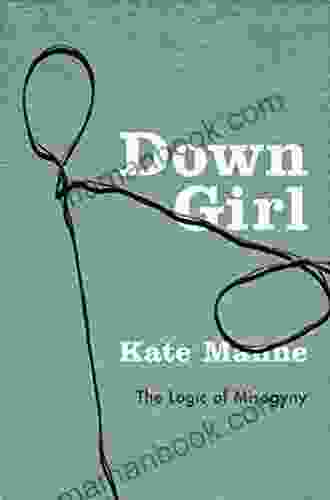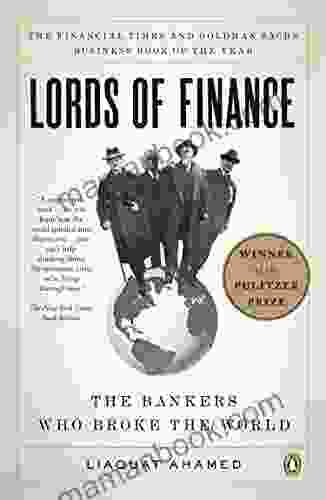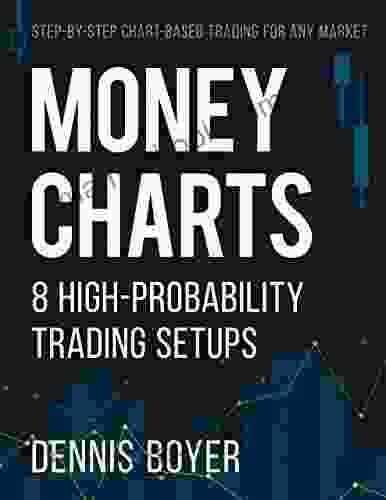The Bankers Who Broke the World: A Comprehensive Analysis

4.6 out of 5
| Language | : | English |
| File size | : | 1889 KB |
| Text-to-Speech | : | Enabled |
| Enhanced typesetting | : | Enabled |
| X-Ray | : | Enabled |
| Word Wise | : | Enabled |
| Print length | : | 588 pages |
| Screen Reader | : | Supported |
In the aftermath of the catastrophic global financial crisis of 2008, the world has been left reeling from its devastating impact. Millions lost their jobs, homes, and life savings, while the global economy teetered on the brink of collapse. At the heart of this financial meltdown lay a group of powerful individuals – bankers – whose reckless decisions and greed played a pivotal role in precipitating the crisis. In this comprehensive analysis, we delve into the motivations, actions, and consequences of these bankers' behavior, exploring the complexities that led to the greatest financial calamity in modern history.
The Rise of Wall Street
In the years leading up to the crisis, the financial industry underwent a profound transformation. The rise of Wall Street as a global financial powerhouse led to the accumulation of immense wealth and power by a select group of bankers. This concentration of financial authority created a culture of hubris and recklessness, where risk-taking was rewarded and accountability was often ignored.
Subprime Mortgages and the Housing Bubble
One of the key factors that contributed to the financial crisis was the surge in subprime mortgages. These high-risk loans, often issued to borrowers with poor credit histories, were aggressively promoted by banks in the pursuit of profit. Subprime mortgages were bundled into complex financial products called mortgage-backed securities (MBSs),which were then sold to investors around the world.
The rise in subprime lending fueled a housing bubble, as increasing numbers of people purchased homes they could not afford. The value of these homes skyrocketed, creating an illusion of wealth and stability. However, the underlying risk associated with subprime mortgages was masked by the complexity of the MBSs, making it difficult for investors to assess their true value.
Derivatives: The Toxic Gamble
Another major player in the financial crisis was the widespread use of derivatives – complex financial instruments that derived their value from underlying assets such as mortgages. Credit default swaps (CDSs),a type of derivative, were particularly prevalent. CDSs allowed investors to bet on the likelihood that a particular debt obligation, such as a subprime mortgage, would default.
The CDS market expanded exponentially in the years leading up to the crisis. Complex and opaque, CDSs were a key tool used by banks to shift risk onto other investors, creating a false sense of security. The widespread use of CDSs further exacerbated the systemic risk inherent in the subprime mortgage market.
The Trigger Event
In 2007, the housing bubble burst as subprime mortgages began to default at an alarming rate. The value of MBSs plummeted, triggering a chain reaction that rippled through the global financial system. CDSs, which were supposed to provide protection against default, became worthless, as the underlying subprime mortgages defaulted in droves.
Systemic Collapse
The collapse of the subprime mortgage market and the ensuing CDS crisis led to a loss of confidence in the financial system. Interbank lending froze, and banks faced a liquidity crisis. Major financial institutions, including Lehman Brothers and Bear Stearns, went bankrupt. The world was plunged into a deep and protracted economic recession, with unemployment soaring and businesses failing.
Role of Bankers
Throughout the lead-up to and during the crisis, bankers played a central role in creating and perpetuating the conditions that led to the collapse. They engaged in reckless lending practices, issued complex and opaque financial products, and ignored the inherent risks in the system.
Driven by greed and a desire for excessive profits, bankers pushed the boundaries of financial innovation, creating complex and untested products that were beyond the comprehension of many investors. They failed to exercise due diligence, often misrepresenting the risks associated with their products and misleading clients in pursuit of commissions.
Moreover, a culture of deregulation and self-regulation allowed banks to operate with minimal oversight. Bankers lobbied against regulations that would have curbed their excessive risk-taking and failed to implement adequate internal controls to prevent abuses.
Consequences
The actions of bankers in the lead-up to the 2008 financial crisis have had profound and lasting consequences. The economic recession caused widespread unemployment, poverty, and social unrest. The loss of trust in the financial system has led to a decline in economic growth and investment.
Moreover, the crisis has eroded public confidence in the integrity of the financial industry. Bankers have become synonymous with greed, recklessness, and irresponsibility, and their actions have cast a shadow over the entire profession.
Accountability and Reform
In the wake of the crisis, there have been calls for increased accountability and regulation in the banking industry. Governments around the world have implemented new regulations, such as the Dodd-Frank Wall Street Reform and Consumer Protection Act in the United States, to prevent a recurrence of the crisis.
However, many critics argue that these reforms do not go far enough and that the banking industry remains too concentrated and unregulated. They call for stronger measures to break up large banks, limit risk-taking, and increase transparency.
The global financial crisis of 2008 was a devastating event that has had far-reaching consequences. The actions of bankers played a central role in precipitating the crisis, and their greed and recklessness left a lasting scar on the world economy and society.
While some steps have been taken to address the systemic risks in the financial industry, much more needs to be done to ensure that a similar crisis does not occur in the future. Increased regulation, accountability, and a fundamental shift in the culture of banking are essential to restoring trust in the financial system and safeguarding the global economy.
4.6 out of 5
| Language | : | English |
| File size | : | 1889 KB |
| Text-to-Speech | : | Enabled |
| Enhanced typesetting | : | Enabled |
| X-Ray | : | Enabled |
| Word Wise | : | Enabled |
| Print length | : | 588 pages |
| Screen Reader | : | Supported |
Do you want to contribute by writing guest posts on this blog?
Please contact us and send us a resume of previous articles that you have written.
 Top Book
Top Book Novel
Novel Fiction
Fiction Nonfiction
Nonfiction Literature
Literature Paperback
Paperback Hardcover
Hardcover E-book
E-book Audiobook
Audiobook Bestseller
Bestseller Classic
Classic Mystery
Mystery Thriller
Thriller Romance
Romance Fantasy
Fantasy Science Fiction
Science Fiction Biography
Biography Memoir
Memoir Autobiography
Autobiography Poetry
Poetry Drama
Drama Historical Fiction
Historical Fiction Self-help
Self-help Young Adult
Young Adult Childrens Books
Childrens Books Graphic Novel
Graphic Novel Anthology
Anthology Series
Series Encyclopedia
Encyclopedia Reference
Reference Guidebook
Guidebook Textbook
Textbook Workbook
Workbook Journal
Journal Diary
Diary Manuscript
Manuscript Folio
Folio Pulp Fiction
Pulp Fiction Short Stories
Short Stories Fairy Tales
Fairy Tales Fables
Fables Mythology
Mythology Philosophy
Philosophy Religion
Religion Spirituality
Spirituality Essays
Essays Critique
Critique Commentary
Commentary Glossary
Glossary Bibliography
Bibliography Index
Index Table of Contents
Table of Contents Preface
Preface Introduction
Introduction Foreword
Foreword Afterword
Afterword Appendices
Appendices Annotations
Annotations Footnotes
Footnotes Epilogue
Epilogue Prologue
Prologue Michele Brenton
Michele Brenton Jane Stern
Jane Stern Shah Peerally
Shah Peerally Nathalie Desiree
Nathalie Desiree Jon Staff
Jon Staff Sarah Ockwell Smith
Sarah Ockwell Smith Albert Pike
Albert Pike Liam Naden
Liam Naden Jeanne St James
Jeanne St James Gus Garcia Roberts
Gus Garcia Roberts Stephen C Kucko
Stephen C Kucko Katarina
Katarina Kronos Ananthsimha
Kronos Ananthsimha Norm Foster
Norm Foster Joann Klusmeyer
Joann Klusmeyer Rebecca Keele
Rebecca Keele Eric Chabot
Eric Chabot Maria Elena Reyes Schafer
Maria Elena Reyes Schafer Benjamin T Smith
Benjamin T Smith James Weldon Johnson
James Weldon Johnson
Light bulbAdvertise smarter! Our strategic ad space ensures maximum exposure. Reserve your spot today!

 Donovan CarterBehind the Net: The Journey of Samantha Belanger, a Rising Star in Volleyball
Donovan CarterBehind the Net: The Journey of Samantha Belanger, a Rising Star in Volleyball
 Amir SimmonsComprehensive Guide to Home Remedies for a Robust Immune System: Boost Your...
Amir SimmonsComprehensive Guide to Home Remedies for a Robust Immune System: Boost Your...
 Adrian WardYoung Bisexual Women's Experiences in Secondary Schools: Routledge Critical...
Adrian WardYoung Bisexual Women's Experiences in Secondary Schools: Routledge Critical... Cooper BellFollow ·15.7k
Cooper BellFollow ·15.7k Ibrahim BlairFollow ·6.2k
Ibrahim BlairFollow ·6.2k Manuel ButlerFollow ·4k
Manuel ButlerFollow ·4k Clark BellFollow ·14.4k
Clark BellFollow ·14.4k Yukio MishimaFollow ·10.5k
Yukio MishimaFollow ·10.5k Anthony WellsFollow ·8.6k
Anthony WellsFollow ·8.6k Robert ReedFollow ·9.5k
Robert ReedFollow ·9.5k Ron BlairFollow ·3.4k
Ron BlairFollow ·3.4k

 Ernest Powell
Ernest PowellBenefits of Corporal Punishment: A Review of the...
Corporal punishment is a form of physical...

 Bobby Howard
Bobby HowardThe Development and Significance of African American...
African American...

 Guy Powell
Guy PowellDown Girl: The Logic of Misogyny - A Comprehensive...
In her groundbreaking work,...

 Forrest Blair
Forrest BlairThe Bikini Changing Room: A Micro Mini Romance
In the heart of...
4.6 out of 5
| Language | : | English |
| File size | : | 1889 KB |
| Text-to-Speech | : | Enabled |
| Enhanced typesetting | : | Enabled |
| X-Ray | : | Enabled |
| Word Wise | : | Enabled |
| Print length | : | 588 pages |
| Screen Reader | : | Supported |









